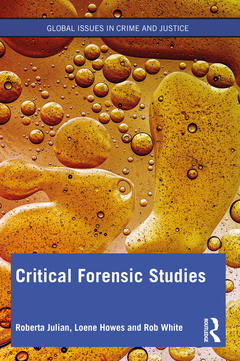Critical Forensic Studies Global Issues in Crime and Justice Series
Auteurs : Julian Roberta, Howes Loene, White Rob

This book provides a comprehensive overview of the emerging interdisciplinary field of critical forensic studies. It reviews existing research and scholarship on forensic science from a critical social science perspective, while forging a blueprint for further work in this area. Forensic science has long captured the public imagination, as evidenced by the popularity of many novels, television programmes, and true-crime podcasts. At the same time, its role in the criminal justice system has been the subject of critique from scholars and practitioners in diverse fields. In response, the international forensic science community has become more involved in the scrutiny of its own knowledge and practices in relation to criminal justice objectives.
Moving beyond a discussion of forensic science as a suite of specialised scientific disciplines that aim to provide evidence to the courts, Critical Forensic Studies offers critical insights relevant to a wide range of social actors in the criminal justice system. Core content includes:
? the history and public understandings of forensic science
? the professionalisation of forensic science
? forensic science as a social process
? crime scene examination and forensic intelligence
? experts and evidence in court
? technological advances and human rights
? interdisciplinary knowledge, practice and research
This book is essential reading for forensic and criminal justice practitioners and students across criminology, sociology, forensic science, law, and psychology.
1.The Theory and Practice of Critical Forensic Studies 2.History of Forensic Science 3.Public Understandings of Forensic Science 4.The Professionalisation of Forensic Science 5.Forensic Science as a Social Process 6.Crime Scene Examination and Forensic Intelligence 7.Offenders, Witnesses and Behavioural Approaches to Forensic Science 8.Interagency Collaboration and Interprofessional Communication 9.Experts and Evidence in Court 10.Technological Advances and Human Rights 11.The Effectiveness of Forensic Science 12.Interdisciplinary Knowledge, Practice and Research
Roberta Julian is Emeritus Professor of Sociology in the School of Social Sciences and founding Director of the Tasmanian Institute of Law Enforcement Studies at the University of Tasmania, Australia.
Loene Howes is a Senior Lecturer in Criminology in the School of Social Sciences at the University of Tasmania, Australia.
Rob White is Distinguished Professor of Criminology in the School of Social Sciences at the University of Tasmania, Australia.
Date de parution : 12-2021
15.6x23.4 cm
Date de parution : 12-2021
15.6x23.4 cm
Thème de Critical Forensic Studies :
Mots-clés :
Forensic Science; Crime Scene; Forensic Investigation; DNA Evidence; Criminalistics; Forensic DNA Analysis; CSI effect; Forensic Intelligence; Crime Scene Investigation; Crime Scene Examination; Forensic Evidence; DNA Database; DNA Profile; Investigative Interviews; DNA Analysis; Forensic Psychology; Forensic Disciplines; Forensic Identification; Forensic DNA; Forensic Studies; National DNA Database; Forensic Literacy; Forensic Process; Professionalization of forensics; CSEs; Human Rights and Forensics; Forensics and technological innovation; NRC Report; Wrongful Convictions; Forensic Anthropology; Forensic Nursing; Forensic Practitioners; Fingerprint Examination; Fingerprint Examiners; Digital Forensics; Social Science Research



